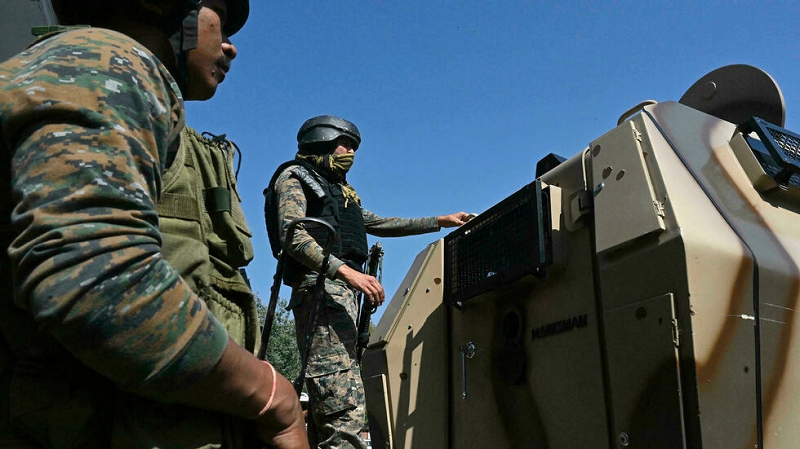
GENEVA:Highlighting the “fragile security environment at the global and regional levels,” Pakistan told a key UN panel on Tuesday that the situation in South Asia was deteriorating primarily because India’s extremist regime had embarked on massive militarisation, among other hostile actions in violation of international law and democratic principles.
Speaking in the Conference on Disarmament (CD), a single multilateral disarmament negotiating forum of the international community, Ambassador Khalil Hashmi, Pakistan’s permanent representative to the UN offices in Geneva, said the New Delhi government was pursuing ideologically driven Hindutva and Hindu Rashtra policies; hegemony; unlawful actions and subversion in neighbouring countries; and unprecedented acquisition, expansion and modernisation of arms and delivery systems that are a threat to Pakistan.
At the same time, he reaffirmed Pakistan’s desires and determination to pursue peace, development and strategic stability, including a peaceful neighbourhood, based on sovereign equality and mutual respect. However, he warned that Pakistan could not remain oblivious to the evolving security dynamics in its immediate neighbourhood and would do whatever it takes to deter and defeat all forms of aggression.
Dealing with New Delhi’s actions, the Pakistani envoy said India, which was seeking a permanent seat at the United Nations Security Council and a self-professed “largest democracy”, continued to violate international law and democratic principles, with impunity.
“Since August 2019, this regime is embarked on imposing a genocidal ‘Final Solution’ in Indian Illegally Occupied Jammu and Kashmir, in open defiance of UN Security Council resolutions,” he said, adding that it had unleashed a brutal reign of terror and oppression on the Kashmiri people, youth, women and civilians, and even against its own minority populations.
“It (India) has financed, facilitated and directed state-sponsored terrorism against Pakistan and other neighbours,” he said. “To mask these crimes, this regime has resorted to the world’s most notorious disinformation campaign, in addition to staging ‘false flag’ operations,” Ambassador Hashmi added.
With regards to militarisation, the Pakistani envoy said India spent $73 billion last year alone on the acquisition and development of new conventional and nonconventional land, air and sea-based weapons systems.
India, he said, had also nuclearized the Indian Ocean; deployed anti-ballistic missile systems; canisterised nuclear capable missiles; acquired anti-satellite weapons; and increased the range and sophistication of all its delivery systems.
“Seventy per cent of India’s weaponry and forces are deployed against Pakistan,” Ambassador Hashmi told delegates. “Lack of global accountability and generous supply of advanced weapons as well as technologies have enabled India to continue its defiance of international law, norms and rules,” he added.
“These acts of omission and commission have emboldened this nuclear armed state to operationalise its dangerous doctrines of pre-emptive aggression against Pakistan into war-fighting strategies, to continue perpetuating occupation and to foment terrorism,” he said.
“The international community, including this body, must call out this impunity and willful defiance of international legality,” he said, adding, “Failure to do so entails risks to regional peace and security in South Asia and beyond.”
Elaborating Pakistan’s position, Ambassador Hashmi said peace and stability in South Asia could be achieved through resolution of the IIOJK dispute in accordance with the UN Security Council resolutions and wishes of the Kashmiri people; maintenance of a balance of conventional and strategic military forces between Pakistan and India; and reciprocal measures for nuclear, missile and military restraint between the two countries. Pakistan’s proposal for a Strategic Restraint Regime in South Asia remained on the table, he added.
Islamabad, he said, considered the CD a vital organ of the international security architecture, but absent a more conducive environment, acknowledgement and redressal of vital national security interests and concerns, the body would likely remain hamstrung, affected also by the tumultuous geo-political and fragile security environment at global and regional levels.
An agreed pathway on concrete measures for strategic stability at the global and regional levels, he added, was essential to mitigate the challenges, requiring interalia compliance with existing nuclear disarmament obligations; redressal of conventional and strategic asymmetries at the regional level, pacific settlement of outstanding disputes, and cessation of destabilizing arms build ups and by addressing the security concerns of all states.






